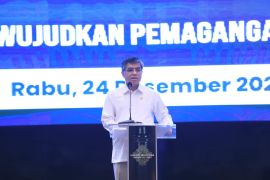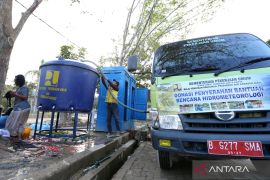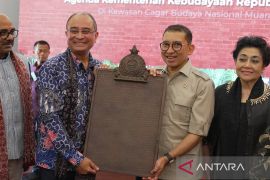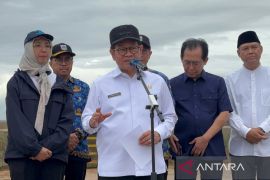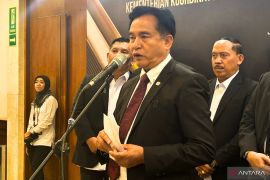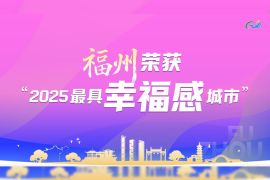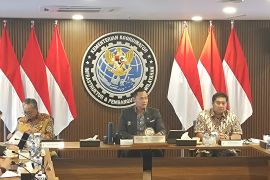In order to overcome this problem, the government will next year improve its policy on the distribution of imported refined sugar so that it would not disturb sugar production in the country. So far, the government imports about 50 percent of sugar need, particularly the need for industries.
Yet, the imported sugar is often leaked into the consumer market, disturbing the marketing of local sugar whose price is relatively higher. For this purpose, the government is conducting an audit on the distribution of imported refined sugar to trace the holes in the system through which the commodity reaches consumer markets,
Director General of Internal Trade Gunaryo said over the weekend that improvement on the government`s policy would be based on the results of the auditing. "We will improve the policy based on the factual condition. We will see the real developments in the field. The results of the auditing will be taken as an input in improving policies," he said.
The director general admitted that up to now refined crystal sugar was still sold in the consumers market despite the fact that this sugar type was imported only for meeting the need of food and beverage industries.
"The leakage of refined sugar into the consumption markets is just possible. The leakage points vary. It can happen at the distribution point," the director general said.
He explained that the trade ministry was still carrying out refined sugar distribution auditing now to map the distribution lines which were prone to leakage.
Gunaryo said the problem was whether producers and distributors had followed the rules based on the trade minister`s decree No. 111/2009, whether they had good documentation on the movements of sugar distribution and whether producers had appointed specified and clear distributors.
The government in May this year called on refined sugar producers to discipline themselves and supply refined sugar only to food and beverage industries in accordance with existing regulations so as not to disrupt the crystal or consumer sugar market.
It also asked producers to assign clear distributors, sub-distributors and to popularize regulations to them. "We ask them to assign clear distributors where each of them is required to sign an integrity pact to make sure that there would be no refined sugar leaked to the retail market," the director general said.
Yet, the Indonesian Cane Sugar Farmers Association (APTRI) said it still found imported refined sugar being sold in the consumption markets at home, such as in Makassar, South Sulawesi. "We have found that it is sold not only in South Sulawesi province but also in other provinces such as in Sumatra," APTRI General Chairman Arum Sabil said.
Based on the results of investigations by APTRI in South Sulawesi on November 23 - 25, 2011, refined sugar was found in a number of areas such as in Makassar and the districts of Maros, Takalar and Goa. "The imported refined sugar is sold Rp400 rupiah cheaper per kg than the white crystal sugar produced locally," Arum said.
According to APTRI Secretary General M Nur Khabsyin, refined sugar with the brand "Bola Manis" produced by PT Makassar Tene, was sold to the consumption market in sacks (each containing 50 kg) at a price range between Rp10,000 and Rp11,000 per kg.
The release into the consumer market of refined sugar has hampered the marketing of crystal white sugar produced by local factories. Its circulation in the consumption market in South Sulawesi caused sugar produced by sugar mills in Java unable to enter the province because the need for sugar in the local market had been met.
Arum also said that the impact of the entry into the consumption markets of refined sugar could be seen from the accumulations of crystal white sugar produced at home at sugar mills` warehouses in Java.
"We are forced to keep it in the warehouse because it could not be dispatched to destinations outside Java for some of the markets have been filled with refined sugar," he said.
He said that if this situation continued to take place the price of crystal white sugar produced at home would continue to drop and farmers would not enjoy a reasonable price. "The price can drop to a level lower than the production cost," he said.
This year, the government allowed the importation of 2.4 million tons of raw sugar which after a process would only amount to about 2.2 million tons. The need for refined sugar of industry this year is estimated at between 2.2 million and 2.3 million tons.
The country`s sugar need is estimated at 5 million tons annually while its crystal white sugar production is expected to reach only 2.57 million tons this year (lower than the earlier projection of 2.7 million tons due to weather anomalies).
Thus, almost 50 percent of domestic demand, including demand from food and beverage industries, should be imported to cover the balance. But the imported sugar is often leaked into the retailer market disrupting local crystal white sugar.
Therefore, the government promised to improve next year`s sugar distribution system and for this purpose it is now conducting an audit on the distribution of sugar in the country.
The results of the audit are to provide pictures on the implementation of refined sugar distribution system from the producers to the distributors. Internal Trade Director General Gunaryo said distributors who did not channel the product based on regulations would be re-identified.
"We will provide recommendations for the authority to decide the import volumes of raw sugar producers have to import. It would be seen whether or not they deserve to maintain their import permits. If they violate regulations they will no longer be given permits to import sugar," he said.(*)
A014/F001
Reporter: Andi Abdussalam
Editor: Jafar M Sidik
Copyright © ANTARA 2011

